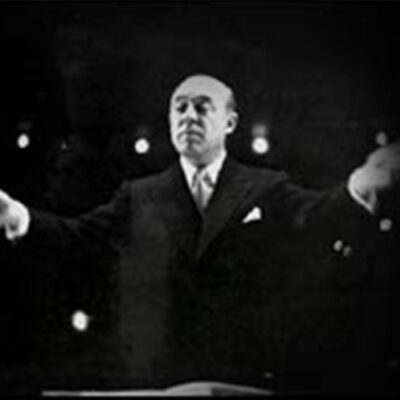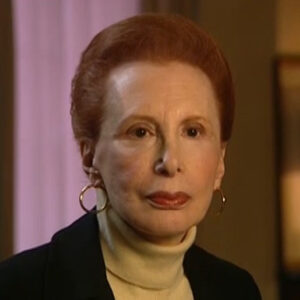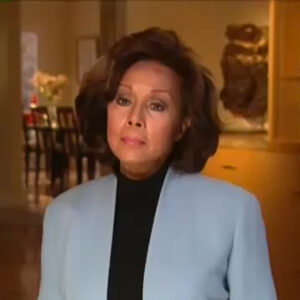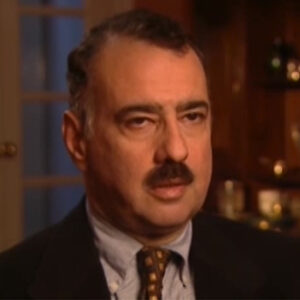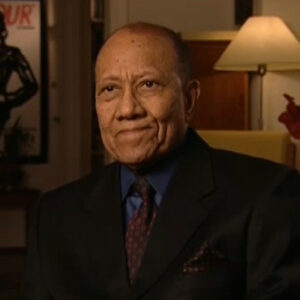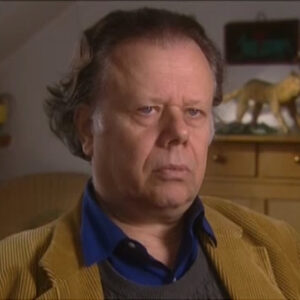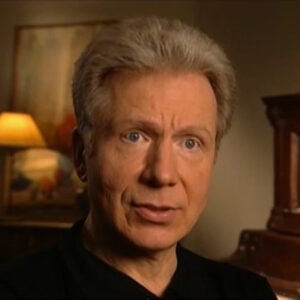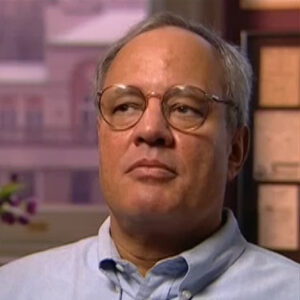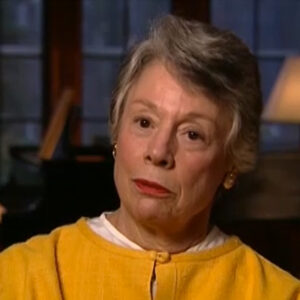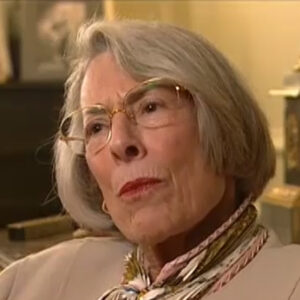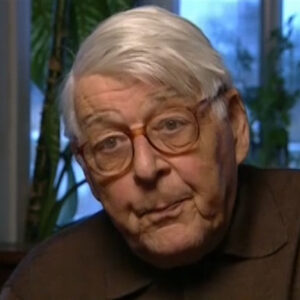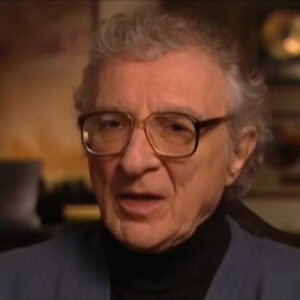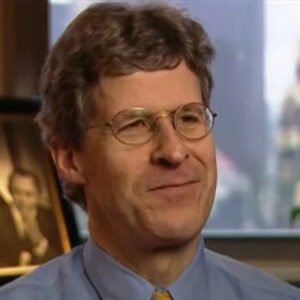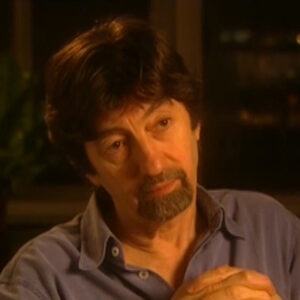Speaker 1 When I was growing up, I first started listening to pop music through people like Stevie Wonder vocalists who wrote and created melody through their voices and had a very distinctive melodic style because of how they sang. I mean, I at least that’s how I hear Stevie Wonder. He may write in a different way, but I also really loved the songs. This is going to be somewhat suspect, but I really loved Paul Williams songs like Here Comes Inspiration. Great song. And you remember the song from the Boy in the Plastic Bubble. You know the theme Boy and Plastic Bubble. What would they say if we up and ran away? The great songwriter. No one thinks so, but I do anyway. Stevie Wonder. And then I played in bands a lot. And that time I guess Hendrix and Crosby, Stills, Nash and Young and I never listen to theater music. I wasn’t it was the last thing I wanted to listen to because well, I guess for the obvious reasons, I just rebelled against it. And there wasn’t a lot of theater music being played in my house or music of any kind. And as far as classical music, I listen to a lot of opera because I sang as a boy soprano and had to learn a lot of scores. And so I guess those were the basic pillars of my early musical life.
Speaker 2 So I don’t want to go into the family, but
Speaker 1 I could just a quick adjustment. I mean, to to.
Speaker 2 Tell me about.
Speaker 1 I also listen to Harry Nilsson, who wrote the score for a wonderful animated piece called The Point, which was about. Very deep and and very emotional, and I loved him then and I love him now because he was sort of a bridge between what I do or what writing for the theatre is and what writing pop is. And some people would say that theatre is heading in a more pop music oriented direction. But he understood something that not a lot of people understand today, which is that there was deep love and emotion in that music and character. And he was a pop writer. And Stevie Wonder.
Speaker 2 It sounds like you were saying you don’t want to go into the family business.
Speaker 1 No, I definitely resisted anything to do with musical theater growing up in the 70s and early 80s. That was just not cool and I suppose it probably still isn’t. But I do it because it’s the most challenging thing that I can think of. And I didn’t really want to work as a writer in the theater until somewhere right in the middle of writing. Floyd Collins, when I realized it was really giving me a lot and I was I was growing.
Speaker 2 You mean you were already writing a show before you said, I even want to write shows? Can you talk about that?
Speaker 1 Oh, absolutely. Yeah. I’m not written other shows before Floyd Collins, but it wasn’t until Floyd, which was sort of towards my late 20s, that I thought, well, this really is endless and endlessness seems like a good proposition. If that’s what you’re choosing to do for for the rest of your time,
Speaker 2 say a little more and tell me I want to hear the word endless again. Tell me why writing theater is painless as opposed to writing rock and roll or writing classical music or.
Speaker 1 Well, I wouldn’t frame writing for the theater in that way. I wouldn’t I wouldn’t set it against writing classical music or rock, rock and roll. But theater is a collaborative art form. And right there the the permutations and possibilities become become certainly much more endless than they would be if I were working on my own. I just went through a kind of gruesome year of trying to write something essentially on my own. And I ended up putting it on the shelf because that’s not how writing for the theater works for me. I’ve I think that I thought for a minute there it might be. But to experience that on forecastable. Symbiosis is so exciting, and when things start to merge and gel together as a result of the efforts of lots of people, it’s there’s there’s no you can’t foresee it. And it’s it’s it’s euphoric.
Speaker 2 I guess you’re you’re somebody almost everybody has said to us, such a bitter man, such a Peter. And I love every single part of it from the out of town tryouts to personals to everything. Can you talk about the band and maybe him as well? And from your own point of view of what it does for you, juices you up? Mm hmm.
Speaker 1 Well, first of all, in terms of my grandfather, it makes great sense to me that he would have been happiest as a part of that social organism, which is theatre from the auditions to the to the rehearsals to working with an orchestrator. And the at least for me, working alone at a piano is is very exciting, but not in the same way. It’s certainly not something I look forward to, but I have to do it to get into a room with other people. Uh. Tell me the question I sort of lost to that
Speaker 2 he was such a theater animal, they loved
Speaker 1 that. And and you want to know? I’m just being a theater animal.
Speaker 2 I mean,
Speaker 1 well, it makes it makes sense to me that he was a theater animal are happiest in the theater, because when I mean my memory of him, he died when I was 15 is that he was somewhat withdrawn. He wasn’t he was not that healthy. So that could have been a big part of it. But but his his energies and his thoughts seem to be seem to be elsewhere. I never got to be around him, really, when he was you know, I was never with him in a theater when he was working. But you can tell by the work itself that that’s where the love is. That’s where the self expression is. I didn’t really get a very strong reading from him being in a room with him as his grandson seemed like a nice guy. He could be very funny. He was affectionate. But this is somebody who’s whose I was on something else.
Speaker 2 We talked about this a little and I thought it was great to follow up. What makes it so? It’s when you talked about the headlines, what makes a great song or a great show or what? Why would it fail?
Speaker 1 Geez, well, if I knew that I know if I knew what made that do it,
Speaker 2 tell me if Richard Rodgers really knew his craft from that point of view.
Speaker 1 The reasons for which Richard Rodgers knew his craft are are unknown to me. I mean, I don’t I really don’t know what his formula was, but he did understand that songs have to be portable. And by that I mean. He may have just done it organically, he probably didn’t work very hard at this, but his melodies were I guess it would be catchy. But another way of putting it would be that his melodies were densely encoded with emotional information about character, about time and place, about where that character was at that moment, even without the words. And he often wrote in response to words when he was working with Hammerstein and with Hart, he often wrote the music first. Is that right? Yes. OK, yes, my point. But I mean, I always cite the example of the song, Glad to Be Unhappy, which is one of my favorite songs of his, because it’s such a Swiss Army song. It’s a song that can you know, it has a magnifying glass. It has a little penknife. It’s it’s it’s sort of at least for me, the only emotion that can apply to any time in life. It’s it’s that duality. I’m I’m I’m so in love. I’m in terrible pain or or the inverse or some associated corollary of that. And even without the words this the melody itself tells us so much about where that person is emotionally not. Yeah, yeah, yeah, I am. De de de de de de de de de de de de de de de. Is it’s hanging in the sphere’s and the lyrics, I guess, got hung on that emotional gesture, just those lines. Is that monophonic line is information. And that’s why I think the theater and writing for the theater or or musical theater will always be relevant because we can hear that that tightly compressed information that is on the infinite grid of music as opposed to language and carry with us and sing it to ourselves and feel that way or make those associations and in this very naturalistic, linear, random access world. It’s nice to have. Those. Keepsakes nice is not really the word, it’s essential.
Speaker 2 I’d like to pursue the emotional possibilities of music a little bit further, if you have to repeat yourself, that’s fine.
Unidentified Repeat yourself. Um.
Speaker 2 I would think that the emotions of a song sort of playing naive devil’s advocate at the same time, I would think that the emotions of the song really come out of the lyrics. And can you talk about how they really can come out of the music and the melody and how Richard Rodgers
Unidentified was able to be so successful that.
Speaker 1 You’re suggesting that it’s arguable that the emotion of a song comes from the lyrics, and my response would be certainly they are interdependent and but they are completely intertwined. And that you cannot. They start again,
Speaker 2 maybe you can start with the music and take it from
Speaker 1 music and lyrics are interdependent. And a song is a product of both together. But think of it this way, we speak English all day. We don’t speak music all day, and music is an infinite. The resolution of the language of music is infinite. In other words, I can say I love you 14 billion ways. And that’s just some of them with music. I can’t say I love you 14 billion ways with English. And that’s one of the reasons that music is easier to write, at least for me. Lyrics are really, really tough to say. I love you in a new way. It’s sort of excruciating at this point. Not the the the lyric is, you know, I’m going to argue the opposite point, that music is more important to the emotional message of a song than the lyric, because music is like coming at us and in waves that we cannot quantify or parse out or understand or relegate to some previous experience. It is it’s new. It’s a it’s it’s a it’s a universal and always fresh language lyrics can be. I can be contemptuous of a lyric. I can I can say it’s a hackneyed thing and certainly there’s hackneyed music. But jeez, if I were to say, am I do I connect with writing music or with writing lyrics? I guess I would have to say I connect with writing music spiritually, emotionally. Lyrics are sort of like rats running around in your head saying, my mother always used to say,
Speaker 2 I think someone said to us, said to me, it wasn’t
Speaker 1 even on. I totally not answer your question.
Speaker 2 Absolutely. Yeah, absolutely. Yeah. I say more about Krispy Kreme someone and I think it was off camera. So if you can if you agree to say something like it said that Rodgers. Conveyed emotion in his plays so that the character on stage didn’t have to say what the emotion he was feeling was. Hmm. Mm hmm. Could you either respond to it?
Speaker 1 Yeah. I think one of the most interesting things in musical theater and in songwriting that my grandfather did really well was was was a lot for this
Speaker 2 big truck to go
Speaker 1 by. OK. One of the most engaging things about certain songs in the theater and some of them were written by my grandfather, is the way in which music was used to express the character’s emotional subtext in a way, or the emotional bottom baseline truth, and that the lyric was used as a red herring or as a way of not distracting, but creating a tension and a complexity. And in in my own gazumping way, I’m probably doing that in certain songs myself. It’s just something I naturally gravitate towards. It could be a just a sign of not wanting to put all my eggs in one basket and stand behind an emotion fully. But there’s a song that I wrote called Baby Moon that I wrote for Audra McDonald, which. In which the music is its active, but it essentially is a hopeful sound, it’s about a woman who’s probably nine months pregnant and is and is really freaking out about whether or not she’s going to be able to do this. And she’s talking to her child and saying, you are really making a mistake here, that I don’t know what I’m doing. And the music is essentially hopeful, but the lyrics are saying just what I said. They’re all about doubt and self-doubt and to to use music as a way, again, the infinite resolution of music to express something as amorphous as anxiety. If it’s something like anxiety, why bother to go to words for that allow since I was out of music anyway, the feeling of anxiety is just a musical feeling. I mean, to go to language is reductive. I mean, that’s coming probably from a composer rather than a lyricist and not really writing lyrics right now. So.
Speaker 2 All right, if you saw some of the shots, some of the emotional scenes, the scene, for example, and you didn’t speak English, would you still get it? Get the emotion, could you? Now that I’ve sort of set it, you can’t just say
Speaker 1 yes or no. Yes. Wait for this car to go by and. OK, well, I’m not the world’s greatest benjamín scholar, but I love to
Speaker 2 be the best.
Speaker 1 OK, Richard Rogers. Yeah. And I think that the bench scene is a perfectly good example of how music can be used to express doubt, trepidation, hesitation, full on enthusiasm. And all those things are going on in that scene. It’s a courtship ritual. It’s a mating dance, and it’s being expressed through his specific musical language. I don’t think you’d get everything from the music, but but. See if I can figure out what exactly is most expressed by the music in that scene in the. It’s the complexity, it’s the complexity of those emotions. You don’t have the time to express that complexity with lyrics, and if you did at the time, it would be a crashing bore. The music is a very efficient way.
Speaker 2 Sorry, I would step down, you say again,
Speaker 1 music is a very efficient way of expressing emotional and ambivalence.
Speaker 2 You were alluding and he maybe even said that things surprised you just before this. What about Richard Rodgers, since you’ve played him, loved him, you got all the albums, I’m sure.
Unidentified What still surprises?
Speaker 1 One of the things that surprises me about his music is his. His harmonic unpredictability, and I think I wasn’t in the room when he was writing, but but because his melodies are so indelible, I have to think that for the most part, unlike many composers today, he allowed the melody to lead him through the song and that the harmonies that supported that melody were written in the sort of creative context of absolute sureness. There was this rock solid event which had already been created. The melody was there and underneath experimentation could happen. Chances could be taken. Precedent could be broken from.
Speaker 2 Can you talk about
Speaker 1 I think that his music is absolutely organic, it seems to spin off like like. Gold, I mean, it doesn’t feel laboured at all, but that’s true of I suppose that’s true of really all great writers. But in terms of his how that was the furnace or the engine of the rest of his life, that makes great sense to me. I certainly function very well when I’m feeling good about my work and when I’m not feeling so good about my work. You know, things begin to break down here and there. I try to compensate in other ways. You know, if I had his particular gift, you know, I’m I’m sure that I’d be doing a much better job right now.
Speaker 2 I’ll be so hard.
Speaker 1 You know, I don’t know a lot of the coordinates of of of his life, I haven’t made a study of of my grandfather’s life or even of his music. And I have to say that the more I try to do this as a job, the more I admire him for what he was able to accomplish. It’s just I mean, I’m already like 95 years old by my age. He had written so many incredible things that are that are still being sung. And it’s really awesome what he did. And then with Hammerstein, he was able to create these like almost cultural movements with these shows that were like international politically relevant. Statements. It’s a lot more difficult to do that now, I think maybe that’s an excuse that I’m making for myself. Things just don’t seem so simple anymore.
Speaker 2 So is he a stumbling block for you, actually?
Speaker 1 I I used to say I used to say that he wasn’t a stumbling block in that in that cliched psychological way, because I, I, I’m loath to be living a big fat cliche. But, you know, how could I avoid that on some level? I’m sure it’s true, but it doesn’t. I’ll say, frankly, I think I have my own stuff to say, and I feel OK about that.
Speaker 2 What makes a Roger Simon, Roger, from you being a musician? Hmm.
Speaker 1 OK. One of the things I think he really understood about Melody and and the line is gravity. In other words, in order to enjoy singing as a singer, I like to have the momentum to get up there and I like to have the freedom to to freely. You know, float back down again. I think he really understood gravity and momentum in songwriting and and how that relates to words and how syllables and vowel sounds sit on melodic lines and on notes. And he was really knowledgeable about and this I say, not having heard him speak one word about this or having read one word about it, I just know from having heard his music, he understood how a vowel was supposed to sit on any particular note to best express the meaning of that word and also give a singer something joyful to do. It’s not difficult. At least I don’t think it’s difficult music to sing. I think it’s sort of uninviting. This is very come hither three songs.
Speaker 2 Could you give us. You don’t have to if you can think of something. Can you give us an example of. The syllables, the tones, the way that
Speaker 1 that work, yeah, sure. I know my friend Larry. This is this is an old example from too many girls, but I like to recognize the tune, but you really love de de de de de de de nada. And I’m probably screwing it up. And you know what? Sacrilege. But anyway, that’s the basic idea that the the the the agility of it. It’s about a tune I’d like to recognize the tune. It’s a it’s the music is expressing the idea of the song fully. And he was doing that. I think you wrote that song when at least in the early 30s. I mean, he was not an old guy. I mean, he understood how those things are supposed to go together. And I don’t think he labored over it very much. As I understand it, he would get up early and he would write for a couple of hours and nothing came. You know, he went to the races or something. I don’t know.
Speaker 2 Can you tell us about going to Oklahoma as a kid with your mom and keep that story about asking? You’re asking?
Speaker 1 Yeah. When I was about two, I went to see a revival of Oklahoma with my mother and I kept saying. When when will it be over and she would say, well, it’s only the middle of the first act, you know, we have another trader and then later, when’s it going to be over? Because I just wanted it to go on forever. And I have to say, I just saw the Trevor Nunn production of Oklahoma and London, and I felt the same way. That is the best single thing I have ever seen in my life. It is a fantastic piece of art.
Speaker 2 We only got to see that the television version of it, and it was incredible, even in those things usually suck.
Speaker 1 It is. Deep and so the energy is just so beautiful,
Speaker 2 what’s new, what what
Speaker 1 what continues to be new about what spoke to you? Well, let’s take in Oklahoma. The song for Joe is Dead. I think that’s the name of the song. And it’s so psychologically savvy and complex. This is a this is a dark character in the show who is allowed and the light character, the sort of hero guy is sort of playing with him psychologically and also accessing something we all do, which is imagine how our funeral is going to be and what the reaction might be to that, this wonderfully indulgent kind of daily activity that we all have. It just feels very fresh, even even today. Those psychological insights, it’s like what they say about comedians, you know, that that comedy is saying what what normal civilians are kind of afraid or too inhibited to say. I mean, I think they’re doing that with a song and and and also very lovingly. Falling in love with love is an example of emotional ambivalence. In the combination of music and lyrics, the lyric is saying, stay away, the music is saying come here and together. The the the product this is a is a is a more complex, certainly more fresh approach to the idea that love is so essential that we feel love about it. It’s like both. And instead of saying something to say I love you is is very difficult to say. Straight out unironic un if you and if you tilt the axis a little bit, you have essentially the same universal human gesture that we all understand and feel. But it’s coming at you in a new way. So I think that Richard Rodgers did that a lot. I mean, the Rodgers and Hammerstein, there were other examples of that kind of thing, like people will say we’re in love or if I loved you, it’s if I loved you. And of course it is. I do love you. But if I loved you because I’ve said I do love you a million times. I mean. And how many I mean, it’s impossible. Said in a new way if I love you, that maybe it’s only been said like five or six.
Speaker 2 Let’s talk about you seem to be sort of touching on Rodgers and Hammerstein as a social social statement and, um. You’ve got to be carefully taught. I mean, can. Can a musical be part of a social movement? Kenneth? For social change, is there what’s the possible?
Speaker 1 Social resonance in musical theater, what a great and treacherous temptation when my grandfather was writing. Now I’m not a historian, but it seems to me that some of these subjects such as. Racially integrated relationships, racism in general. We’re sitting ducks for dramatic exploitation or the expounding they’re on today. I mean, all of that stuff has been done. It would be really old school to do it again. I think that for for me anyway, to write about society, to try to be socially resonant is a dead end. To write about myself, to look within is really the only way that I can have any social resonance. Those themes that were so important and so beautifully done by them are not available anymore. Those those properties have been it’s not that there are no more angles on racism, certainly. And I but I feel that that for me that’s a that’s a treacherous those are rocky shoals. I don’t. First of all, I don’t come from the right side of the tracks, artistically speaking, I come from the wrong side of the tracks in our culture. If you come from the right side of the tracks as far as social position, you’re from the wrong side of the tracks. Artistically, I guess I’m just on the tracks at this point. But I think that my safe passage is within and that is how I can be socially resonant and relevant. Whereas those themes that Rodgers and Hammerstein addressed were essential and wonderfully done, but not really available anymore.
Speaker 2 Were they social statements or were they just sort of light touches at them? They they never were completely direct, you know, dancing around a little bit each each way. Were they actually. And can you give any examples?
Speaker 1 Well, I. I don’t know for sure, again, I’m being intuitive about this, but I imagine that they never approached to show along the following lines. Let’s make a statement about race. They probably found a really great story which had been too hot to touch socially or politically speaking, before people of their stature at that time hit upon that idea. And the story was what turned them on and got them motivated. And the fact that it had a kind of social and political value and was new and important and important message was was embedded. There was secondary. I think the stories and the characters came first, that they needed to be vessels for musical drama.
Speaker 2 And so the social statements, what they also think once they got him to, where were they saying?
Speaker 1 Well, I don’t know. I know that the social statements that are embedded in those shows were incredibly important to the shows and certainly important to how they are thought of today in terms of their newness. But I don’t think that you craft a theater piece with the message first. And I don’t I can’t imagine that they would have gone about it that way. What was going on in my grandfather’s music was not played in my house very much. It wasn’t there was no boycott or moratorium on his music. It was just that there wasn’t a lot of music being played out of the stereo. I was sort of fooling around at the piano. My mother was still writing, but music in our house was not what it might have been or maybe is for many houses. It wasn’t a way of decorating or a way of creating a joyful noise to live inside of. It was like, am I threatened by this? And have I written today? You know, it was complex. It was a complex thing. And it is for me today. I don’t play music all day long like a lot of my writer friends who write words, I mean, or my painter friends who listen to music all day. My mother. I think music made my mother nervous. I think it brought up a lot of stuff for her that, you know, she’d rather live without. And when music was going on, it was sort of like for for a work purpose were either making the music or writing the music or listening to to learn from. I rarely remember my grandfather’s music being on. I would say Stephen Sondheim’s music was on much more. And if there was a writer who I cotton to, it was it was Sondheim.
Speaker 2 When did you realize that your grandfather was the Richard Rodgers?
Speaker 1 I realize my grandfather, my grandfather was the Richard Rodgers very early on, but I didn’t realize until recently what the Richard Rodgers was meant. To me now, the Richard Rodgers, a guy who just like was a freak, he did an amazing amount of really, really first rate work and it cost him. But we live with the wonderful dividends of that as my fact. I live on the dividends of that. Well, I didn’t know him well. I speak mostly from hearsay, from having heard my mother talk about my grandfather and his just the the ambience around that house and. His joy was in the theater and I mean, not physically, I mean, he seemed withdrawn and. That he had just gotten off the roller coaster and he wasn’t going to get to go around again for another ride. And as you know, as a young musician and someone who. Wanted to be. Making a contribution, not necessarily to the theater, because that didn’t come from me way later, it felt a lot like getting to the bus stop and just sort of seeing the tail lights. And to find a new motivation for making musical theater has been a long process for me. And I think it’s a lot more akin to holding a candle in the dark than lots of neon signs and fireworks and, you know, spotlights and the on the evening skyline of glamorous openings. I mean, I do think that era is is past and I don’t really have too much more lingering sadness about that. It’s a it’s a quieter thing. And you asked me more about him, like, what was his? I think that there’s a lot of sadness in his music. It’s. It’s very still at times, it can be obviously is very playful, it can be very anthemic. So the word anthemic songs like You’ll Never Walk Alone or some of the stuff with Hammerstein, certainly. But there’s a stillness and a quietness. A song like The Sweetest Sounds, which he wrote the lyric to as well, is is a very inward and in a way. Such a personal thing to come from a government, a composer, the sweetest sounds are still inside my head and I couldn’t agree more. That’s. I guess that’s always the case.
Speaker 2 You are the one I mean, you’re talking about the that it’s over. What they did is of. But here you are trying to do it and pretty successfully, I mean, you are one of the preeminent composers of your generation. Um.
Speaker 1 Can I just respond to that? I just love that you said that I’m one of the preeminent composers of my generation because it’s like calling me one of the preeminent manuscript illuminators of my generation. It’s like, you know, I really have to go to a much more process oriented place because I don’t think being a preeminent composer for the musical theater really adds up to much on the broader cultural horizon. And I think that’s OK. I mean, but it must be said that I am living off of the the fruits of my grandfather’s labor and I am allowed to live well and choose the projects that I want and take my time with them because of that. So it’s easy for me to say that I’m OK holding a candle in the dark, but there’s probably a lot of people who would actually like to grind out a living doing this, and I can’t really speak for them. OK, fine.
Speaker 2 However, he is. One of the greatest composers of the 20th century, and you are now working in the 21st century and trying to make important, relevant, entertaining music, um. What does Richard Rogers of the 20th century say to composers and the rest of us in the twenty first century?
Speaker 1 I think that what I the message that I receive from his body of work is because of how organic it feels when you hear it, how natural it sounds, it is trust that if it’s hard and it’s labor to. Right. I’m speaking about music for the most part because lyrics are just for me. They’re labor no matter what, very few exceptions. But but if it’s if it’s coming out of you in a natural way, trust that if it’s simple and clean and. Lovely and unashamed trust that complexity is not a value unto itself.
Speaker 2 Tell us. About his presence today, you talked about what we talked about on the phone a little bit. You said you had conversation. What conversations now then? And maybe you could say he died when I was this age and going to keep that. And what is he what does he tell you? What is what are your discussions?
Speaker 1 You know, it’s funny. I had a dream not that long ago, maybe two years ago. And it was the only dreams this kind of ever had because in real life, I only got to play my music once. He was literally on his deathbed. And I played one of the first things I’d ever written through the wall that separated, delivering a living room where the piano was in his bedroom. And I sort of pounded out this thing and then I rushed in, you know, what do you think? And he said he thought it was nice and he was nice about it. But I had this dream where I said, I know that this is going to make you uncomfortable, but I have to ask you, what do you think of my work? And he said, you you have your own thing. And I woke up. You know, sometimes dreams can really be powerful in your life. And I woke up and he was a little reticent about it. He didn’t go crazy with the compliments. Let me just say that in this dream, I don’t know who was talking him or me, but he just said, you have your own thing. And I woke up feeling very relieved somehow. I mean, I wish that I had come to be sooner or he had passed away later so that I could have had more of a dialogue with him. But a lot of times when I’m writing, I’ll do something. I’ll be at the piano. And it’s not that I hear him or his voice talking to me, but I’ll think I sort of say something to him like, oh, my gosh, I just did that thing. And I think you’ve done that, something like that. I mean, especially in terms of harmony. He was I don’t think that I’m I’m in the same ballpark melodically or we’re just in different ballparks. But harmonically, he had certain tricks that he used and certain things that were very effective in his work that kept things kind of off axis, that kept them unexpected but inevitable, as Steve Sondheim often says, fresh but inevitable that I you know, I really admire that and his stuff. And every once in a while, I might stumble on something akin to that and feel that there’s sort of a musical dialogue, not not a verbal dialogue.
Speaker 2 Is there an example of a song that you that has that, Oggi? In his. You talk about. Melody or harmony? And that’s a little bit.
Speaker 1 It’s the kind of thing where at the next break, if there is one, I’d like to think of what that might be and then you could ask me again.
Speaker 2 I want you to tell me the story again about playing music for him just the way you did, except you were sort of rushed because that wasn’t the story right now. You were going to tell us other stories. Yes, that is its own because it’s a lovely touching story.
Speaker 1 I think it was about. Fourteen and I just started writing music and I had just learned and B voicings is sort of a jazz term and that was my first little toolbox for writing. Before that, I just knew classical piano and I have no foothold in writing through the classical idiom. But then I got these tools from jazz and I started messing around with that. And I came up with a couple of things and he was on his deathbed at this time. He died when I was just 15, so I must have been 14. And I played my first thing through the wall that separated the living room and the bedroom where he was lying. And I. Played it pretty loud so we could hear it. Then I rushed around and he you know, he said that he thought it was nice and he liked it and he was very kind. I I’m glad that happened. I just wish that I had started writing earlier. He had lived longer because I should have so much to ask him now.
Speaker 2 Like what? What would you ask your grandfather?
Speaker 1 Like, how do I get out of this corner that I have just backed into,
Speaker 2 as I’d like to
Speaker 1 I’d like to ask him, how do I get out of this musical corner that I’ve just backed myself into? You know, I really think I got there for very appropriate reasons. I’m going for this way over here, but somehow I’ve gotten on the wrong track. What do they do? I mean, you know, and to be able to to ask someone of his experience, you know, what he might do would be invaluable. But and I’m not really the type of person who can get the answers to those questions by studying other people’s work or or I really get the answers to those questions by doing it wrong and then having to do it again, because doing it wrong tells me kind of more about how to do it right. But he certainly would have been able to save me that that step.
Speaker 2 OK, let’s do a little exercise. Let’s play a little game, OK? Don’t be Adam Gettle for a second, Richard Rodgers, and talk to your grandson. OK, here’s here’s how you get out of that hole.
Speaker 1 First of all, I have to think of a hole that I’m back to yourself. Yeah, now I know. I know. Now, what
Speaker 2 do you think if he was talking to you?
Speaker 1 Yeah, I think if I were to impersonate him and respond to a question that I might have about getting out of a musical predicament, I would try to shift my perspective. You know, Einstein said you can’t solve a thorny problem from the same point of view. You got to shift your point of view and might be saying. It I know it comes here and I got off at this point, I don’t know where I made the mistake, I would probably advise me if I were him to look elsewhere for the the inciting event further back or higher up, you know, just someone to slap you around, say, no, no. You’re you’re being myopic. You’re.
Speaker 2 Is he there for you for those things?
Speaker 1 No, I wouldn’t say that my grandfather is a constant musical companion or teacher in that in that sort of like, hey, what do you think about, you know, I just don’t I don’t live with him in that way. But he’s there for me in the sense that there is a standard to aspire to. And there’s nothing unknowable about aspiring to that and failing. And that’s what Floyd is about. That’s a Floyd Collins is about. If you get trapped in that dream, at least it was, you know, pretty classic dream.
Speaker 2 You said something in one of your questions that I want to follow up. And I just wrote down, trust us. What were you talking about? About trust. Does anybody remember trust us? Because I thought of it and I wrote it down. I said, I want to have you go through that again. No, OK. Trust us. Oh, that’s interesting. We’re talking about backing ourselves into a musical. Are there any examples of songs where Rodgers looks like he’s backing himself into a musical corner and then all of a sudden he goes, look at this.
Speaker 1 Is it OK if I think for a second. I have one more second.
Unidentified The. OK, Raleigh,
Speaker 2 if you can sing a little.
Speaker 1 Yeah, I was going to. There are times when I hear a song in my grandfather’s and I think, OK, this is a little substandard, this isn’t quite up to the level. But then he’ll like swoop in with something that will kind of blow me away and humble me and and, you know, remind me that he didn’t write a lot of substandard stuff, like just in in the driest terms. Take that song, My Romance. De de de de de de de de de de de de de de de de de de de de de de de de de de de de de de de de de de de Niro. Phrasing wise, we’re kind of. Oh, but and as you first hear that or as you hear it and you forget about the ending, thinking, well, it’s a little end and then he goes and da da da ba da da da da da da da da da da da da da da ba da da da da da da. Nobody that I like. I don’t know why that feels out of the blue to me. It’s the third degree instead of the first. It’s just not expected. And because of the and that we’ve been kind of lulled into and feel superior to this gesture at the end is that much more powerful. And so he backed out of that corner pretty nicely. I mean, that’s an example. Greg.

